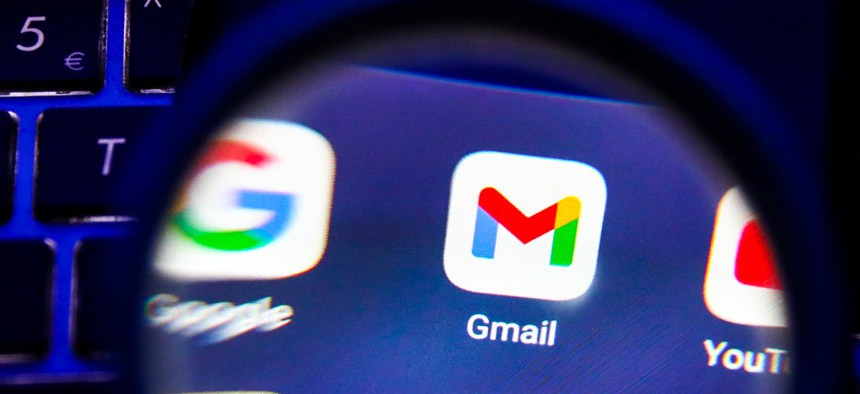FEC to Vote on Google’s Plan to Keep Campaign Emails Out of Spam

Beata Zawrzel/NurPhoto via Getty Images
Google’s proposal to allow emails from authorized candidates and committees to be exempt from the company’s spam filters has received pushback from Democrats, Republicans and the general public.
The Federal Election Commission is planning to vote later this week on Google’s proposed pilot program to keep eligible political campaign emails out of spam folders, saying that the plan does not violate federal campaign finance laws.
In a draft opinion released last week, the FEC said that Google’s proposed program was permissible and “would not result in the making of a prohibited in-kind contribution.” The FEC is slated to vote on the proposal at its August 11 meeting.
“Although the spam filter functionality would be modified for the pilot participants—namely, they would have their bulk emails filtered for spam by the new ‘user preference’ mechanism, as opposed to algorithms applying additional filters, and receive more detailed information about their inboxing rate—these would all be mere modifications to Google’s free spam filtering service that Google provides to all users, rather than a service that customarily has a separate charge,” the FEC’s draft opinion said in part.
Republican lawmakers have claimed that Google’s algorithms and filtering techniques are biased against conservatives, citing a study published by North Carolina State University in March which found that Gmail directed 77 percent of campaign emails from right-wing candidates to the spam folder, while roughly 10 percent of left-wing candidates’ campaign emails were marked as spam. The RNC filed a complaint with the FEC in April, claiming that Google’s alleged algorithmic bias constituted “illegal, corporate in-kind contributions to the Biden campaign and Democrat candidates.”
Senator John Thune, R-S.D., and other GOP senators also introduced legislation in June— the Political BIAS Emails Act—that would “prohibit providers of email services from using filtering algorithms to flag emails from political campaigns that consumers have elected to receive as spam.”
In response to Republicans’ concerns, Google asked the FEC in a July 1 advisory opinion request to allow for a pilot program that would exempt eligible campaign solicitations from the company’s spam filters. According to Google’s filing with the commission, the pilot would be open to “authorized candidate committees, political party committees and leadership political action committees” that are registered with the commission for the 2022 midterm elections and “meet objective security criteria, such as implementation of technical authentication standards.”
A spokesperson for Google, José Castañeda, told Nextgov that the company does not filter emails based on political affiliation, but asked the FEC to authorize the pilot initiative to “help improve inboxing rates for political bulk senders and provide more transparency into email deliverability, while still letting users protect their inboxes by unsubscribing or labeling emails as spam.”
Google’s proposal to allow more campaign emails to go directly to users’ Gmail inboxes has been met with opposition from the general public, as well as Democrats and Republicans. As of August 9, the FEC has received more than 2,600 public comments in response to Google’s proposed pilot program, with the vast majority of commenters against the idea.
Republicans are reportedly unhappy with the proposed program, believing that it does not go far enough and is being rolled out too late in the 2022 midterm cycle. According to The Washington Post, the National Republican Senatorial Committee is asking GOP senators to sign on to a letter from the NRSC calling the proposal “unacceptable” and “too risky for campaigns.” The report said that the effort is being led by Sen. Chuck Grassley, R-Iowa. A spokesperson for Grassley referred questions to the NRSC, which did not respond to requests for comment.
Democrats have also voiced opposition to Google’s proposed program, alleging that the pilot would allow GOP campaigns to propagate misinformation for financial gain.
“This program will undermine the Commission’s stated goal to protect political donors from deceptive solicitations by increasing the likelihood that such solicitations will reach donors’ inboxes,” Sam Cornale, executive director of the Democratic National Committee, wrote in comments submitted to the FEC on August 4. “With Google’s spam filter removed, participating committees will be incentivized to employ the abusive fundraising tactics that Google’s spam filters would have otherwise caught, with the knowledge that this behavior will not be curtailed, but rather rewarded.”
NEXT STORY: Senate appropriators seek alternatives to TMF






